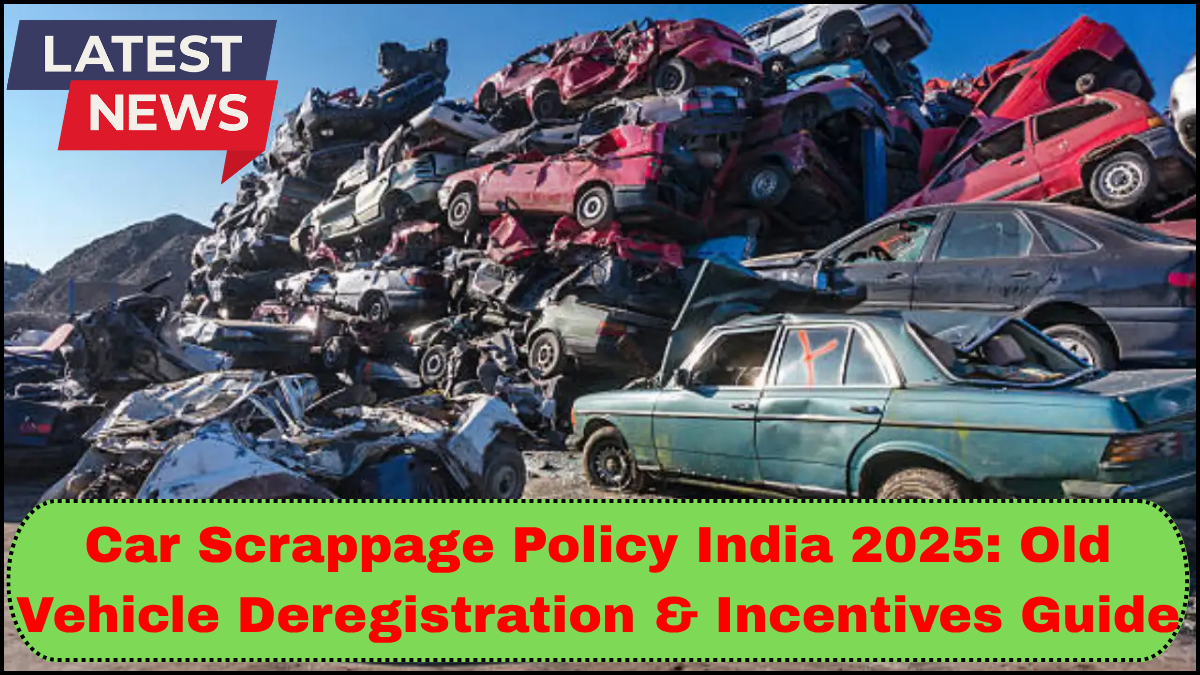India is preparing to enforce a major shift in its automotive policy landscape with the Car Scrappage Policy India 2025. This initiative is a government-backed program aimed at phasing out unfit, polluting vehicles and promoting cleaner mobility solutions. The policy is expected to bring economic, environmental, and safety benefits while reshaping how India manages its aging automotive fleet.

What Is the Car Scrappage Policy India 2025?
The Car Scrappage Policy India 2025 is a structured program designed to encourage voluntary deregistration of old, polluting vehicles. As per the policy, vehicles that fail to meet fitness norms or exceed the age limits set by the government will be eligible—or in some cases, mandated—for scrappage.
This initiative is a continuation and expansion of the voluntary vehicle scrappage policy announced in 2021. From April 2025, the program will become stricter, especially for private cars older than 20 years and commercial vehicles older than 15 years, particularly if they fail to pass automated fitness tests.
Why the Policy Was Introduced
The Indian government’s move is based on several key objectives:
-
Environmental Protection: Older vehicles are significant contributors to air pollution due to outdated technology and inefficient combustion systems.
-
Road Safety: Aging vehicles often lack modern safety features, increasing accident risks.
-
Energy Efficiency: Newer vehicles offer better fuel economy and lower emissions.
-
Boost to the Auto Sector: The policy is expected to stimulate new vehicle sales and generate demand in the automotive ecosystem.
Criteria for Deregistration of Old Vehicles
Under the Car Scrappage Policy India 2025, deregistration of old vehicles will be enforced based on several factors:
-
Age: Private vehicles over 20 years and commercial vehicles over 15 years.
-
Fitness Test: Conducted at government-approved Automated Testing Stations. Vehicles that fail to meet required standards will be deregistered.
-
Emission Compliance: Non-compliant vehicles with outdated emission standards (pre-BS IV) will be ineligible for registration renewal.
Incentives for Voluntary Vehicle Scrappage
To make the transition smoother, the government is offering a set of incentives to encourage vehicle owners to scrap their old vehicles voluntarily:
-
Scrappage Certificate: Issued after successful vehicle scrapping, this can be used to avail benefits on the purchase of a new vehicle.
-
Road Tax Rebate: State governments may offer up to 25% rebate on road tax for new vehicle purchases against a scrappage certificate.
-
Registration Fee Waiver: Possible exemption from registration fees for new vehicles.
-
Automaker Discounts: Some OEMs may offer discounts or exchange bonuses for scrappage certificate holders.
-
GST Considerations: There’s ongoing industry lobbying for GST concessions on new vehicles bought after scrapping old ones, although this is not finalized.
How to Scrap Your Vehicle in 2025
Here’s a step-by-step guide:
-
Fitness Test: Take your vehicle to an approved Automated Testing Station.
-
Failing the Test: If the vehicle fails and cannot be repaired to meet standards, it must be scrapped.
-
Apply for Scrappage: Submit a request to a Registered Vehicle Scrapping Facility (RVSF).
-
Receive Scrappage Certificate: After dismantling, you receive a digital certificate to claim incentives.
-
Deregister the Vehicle: The RTO will officially deregister the vehicle based on the scrappage certificate.
Economic Impact of the Scrappage Policy
The Car Scrappage Policy India 2025 is projected to have widespread economic effects:
-
Job Creation: Thousands of new jobs expected in scrapping centers and automotive supply chains.
-
Raw Material Recovery: Valuable materials like steel, aluminum, and plastic can be recycled, reducing reliance on imports.
-
Revenue Growth: Boost in vehicle sales, component manufacturing, and related services.
Challenges and Concerns
While the policy has many upsides, several hurdles remain:
-
Infrastructure Readiness: India’s scrapping facilities and fitness testing centers need significant expansion.
-
Awareness and Acceptance: Many vehicle owners, especially in rural areas, may resist scrapping due to emotional attachment or lack of awareness.
-
Implementation Uniformity: Varying road tax policies across states could impact the effectiveness of incentives.
Future Outlook
The success of the Car Scrappage Policy India 2025 depends on its enforcement, public awareness, and coordination between central and state authorities. The policy has the potential to modernize India’s automotive landscape, reduce pollution, and promote a circular economy, provided implementation stays on course.
Frequently Asked Questions (FAQs)
Q1: What is the age limit for vehicle scrappage under this policy?
A: Private vehicles over 20 years and commercial vehicles over 15 years are targeted for scrappage if they fail a fitness test.
Q2: Is scrapping mandatory under the Car Scrappage Policy India 2025?
A: It is mandatory for government and commercial vehicles that fail fitness tests, but voluntary for private vehicle owners—with incentives to encourage participation.
Q3: Where can I scrap my car in India?
A: Vehicles can be scrapped at government-approved Registered Vehicle Scrapping Facilities (RVSFs) across the country.
Q4: What is a scrappage certificate and how do I use it?
A: It’s proof that your old vehicle has been scrapped. It can be used to claim discounts, road tax rebates, and other benefits when purchasing a new vehicle.
Q5: Will I get a refund or money for scrapping my old car?
A: Yes, in most cases, scrapping facilities offer payment based on the salvage value of your vehicle. Plus, you receive a certificate to access additional incentives.
click here to learn more